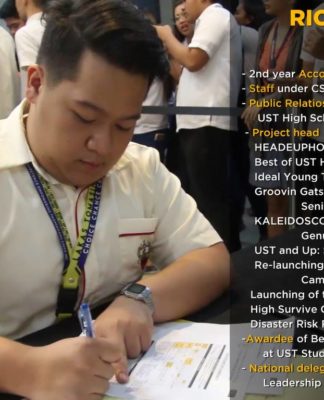THREE Thomasian justices in the Supreme Court have ruled in favor of President Gloria Macapagal-Arroyo, giving her the power to appoint the next chief justice when Reynato Puno retires on May 17.
Thomasian associate justices Roberto Abad and Diosdado Peralta concurred with the ruling of the majority that President Arroyo may name Puno’s successor as the chief justice post is not covered by the constitutional prohibition in “midnight” appointments.
The landmark ruling was penned by Associate Justice Lucas Bersamin, also a Thomasian professor. Abad was a former dean of the Faculty of Civil Law, while Peralta, who graduated law in UST, teaches in the faculty.
Ironically, the ruling was opposed by the Civil Law Student Council in a statement, and did not sit well with a constitutional law professor in the faculty.
“Personally, I don’t agree with them. It seems to me that the spirit and the language on constitutional ban are clear enough,” said Rene Gorospe, constitutional law professor.
Civil Law Dean Nilo Divina did not comment on the outcome of the Supreme Court voting where all Thomasian justices, except Renato Corona who inhibited himself, ruled in Mrs. Arroyo’s favor.
“I am a disciple of the law and I also have my own interpretation of the issue even before the decision broke. At a certain point, controversies must end, the Supreme Court always has the final say,” Divina said.
Other justices who concurred with the decision last March 16 were Jose Perez, Martin Villarama, Teresita de Castro, Arturo Brion, Jose Mendoza, and Mariano del Castillo. Only Associate Justice Conchita Carpio-Morales voted “no,” while Antonio Eduardo Nachura, and Presbitero Velasco, Jr. said the case should be dismissed because it was “premature.”
The Supreme Court, with the same vote, dropped a motion for reconsideration filed by petitioners and intervenors last April 20, ruling with finality on the case.
The nine justices argued the judiciary branch is not covered by Article VII, Section 15 of the 1987 Constitution, which prevents an outgoing president from making appointments to government posts two months before the elections.
“Two months immediately before the next presidential elections and up to the end of his term, a President or Acting President shall not make appointments, except temporary appointments to executive positions when continued vacancies therein will prejudice public service or endanger public safety,” the provision stated.
But former Varsitarian managing editor and lawyer Teodoro Lorenzo Fernandez said the decision had legal bases.
“If you will look at the decision, it is legally sound, the explanation is very well written because both contradicting provisions [Article VII and Article VIII] in the Constitution were included,” Fernandez said. “The appointment is now upon the President’s discretion.”
Article VIII, Section 9 of the Constitution provides that the President can make appointments to the judiciary within 90 days upon the existence of a vacancy in the judiciary.
But Gorospe said: “An outgoing president’s job is to ensure a peaceful transition to his successor’s term. It would be the next president’s agenda to appoint his officials,” he added.
Divina said the case should be put into rest since the Supreme Court had spoken.
“The Supreme Court has already spoken, and we have to abide by it, [whether it is] right or wrong” Divina said.
Fernandez agreed.
“The decision will always be subjected to various interpretations. Though some may not agree, the fact remains that a final decision has been reached,” he said. Adrienne Jesse A. Maleficio















